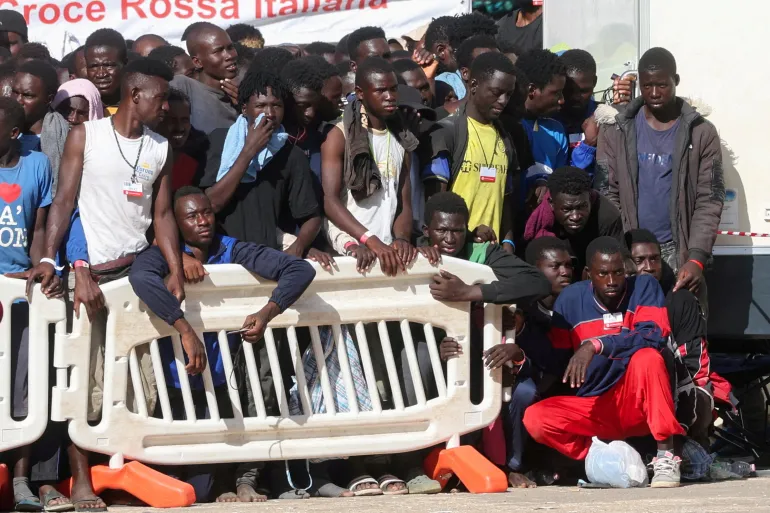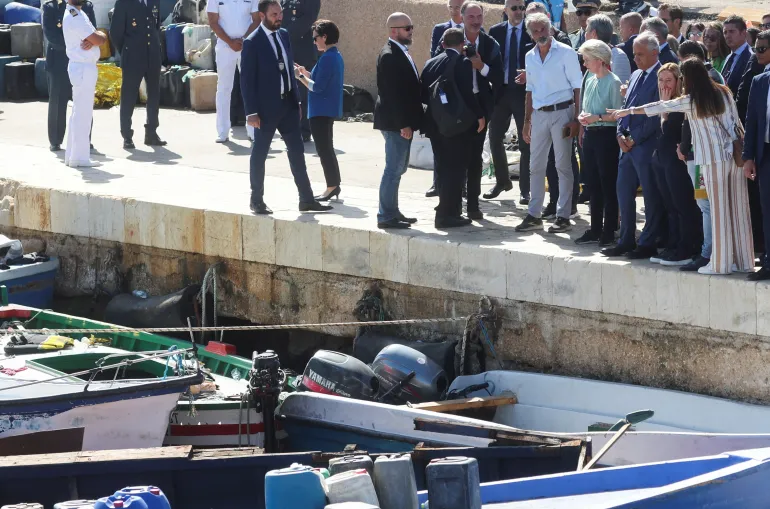Italian Government Passes Stricter Measures Amid Migrant Surge
Italian Government passes stricter measures amid migrant surge. The Italian government, grappling with a substantial increase in arriving migrants, has implemented measures to extend the duration of their detention and enhance repatriation efforts.
Author:Suleman ShahReviewer:Han JuSep 19, 202324.4K Shares699.8K Views

Italian Government passes stricter measures amid migrant surge. The Italian government, grappling with a substantial increase in arriving migrants, has implemented measures to extend the duration of their detention and enhance repatriation efforts.
These measures come in response to a recent influx of almost 10,000 migrants to the southern Italian island of Lampedusa.
The situation has posed a challenge to Italy's right-wing Prime Minister Giorgia Meloni, who came to power with promises to address illegal immigration.
Migrant Detention Period Extended
Prime Minister Meloni proposed that migrants awaiting repatriation should be detained for an initial six months, extendable to up to 18 months, a significant increase from the current three-month period.
This extension is intended to provide adequate time for assessments and facilitate the repatriation process for individuals who do not qualify for international protection.
To accommodate the extended detention period, the Italian government plans to establish additional detention centers in remote areas.
Prime Minister Meloni emphasized the necessity of increasing the capacity of these facilities, which she claims have been weakened by years of immigration-focused policies.
Under Italian law, migrants facing repatriation can be held if immediate expulsion is not possible. The majority of migrants arriving in Italy are believed to do so for economic reasons and do not qualify for asylum.
However, past efforts to detain migrants have had limited success, as many detained individuals have repeatedly escaped from detention centers, often making their way to wealthier northern European countries.

International Response And EU Measures
Prime Minister Meloni's recent visit to Lampedusa, accompanied by European Commission President Ursula von der Leyen, resulted in promises of a 10-point European Union action plan to address the situation.
However, these measures bear similarities to previous initiatives that have yielded limited results.
The Italian government's actions to curb the flow of migrants have faced criticism from the opposition and human rights groups.
The Italian Coalition for Civil Rights and Liberties (CILD) has described detention centers as "black holes" where fundamental rights violations occur, in addition to being expensive and inefficient.
Italy has been experiencing a significant migration crisis, with nearly 10,000 people landing on Lampedusa in just one week.
The country has witnessed a surge in arrivals, with over 127,000 refugees and migrants arriving in Italy so far this year, almost double the figure for the same period in the previous year.
These migrants originate from various countries, including Guinea, Ivory Coast, Tunisia, Egypt, Burkina Faso, Bangladesh, and Pakistan.
Bilateral Repatriation Agreements And Challenges
Repatriation efforts are complicated by Italy's limited bilateral agreements with certain countries, leading to delays in returning individuals to their home countries.
According to the think-tank Openpolis, only 20 percent of those issued repatriation orders left Italy between 2014 and 2020.
France has expressed its intention to assist Italy in securing its borders and addressing the migrant crisis.
French Interior Minister Gerald Darmanin emphasized the need to protect the EU's external border and promptly evaluate asylum requests, deporting individuals who do not qualify for asylum to their countries of origin.
The Italian government's latest measures aim to address the ongoing challenges posed by irregular migration, but their effectiveness remains a subject of debate and scrutiny.
Final Words
In response to a surge in migrant arrivals, the Italian government has extended the detention period for migrants awaiting repatriation and plans to establish more detention centers in remote areas.
Prime Minister Giorgia Meloni's efforts to curb illegal immigration come as Italy faces a significant migration crisis, with nearly 10,000 migrants arriving on the island of Lampedusa in a week.
However, these measures have drawn criticism from opposition parties and human rights groups, highlighting challenges in managing migration flows.
International cooperation and border security remain crucial as Italy grapples with the complex issue of irregular migration. The effectiveness of these measures will be closely monitored amid ongoing debates on migration policies.

Suleman Shah
Author
Suleman Shah is a researcher and freelance writer. As a researcher, he has worked with MNS University of Agriculture, Multan (Pakistan) and Texas A & M University (USA). He regularly writes science articles and blogs for science news website immersse.com and open access publishers OA Publishing London and Scientific Times. He loves to keep himself updated on scientific developments and convert these developments into everyday language to update the readers about the developments in the scientific era. His primary research focus is Plant sciences, and he contributed to this field by publishing his research in scientific journals and presenting his work at many Conferences.
Shah graduated from the University of Agriculture Faisalabad (Pakistan) and started his professional carrier with Jaffer Agro Services and later with the Agriculture Department of the Government of Pakistan. His research interest compelled and attracted him to proceed with his carrier in Plant sciences research. So, he started his Ph.D. in Soil Science at MNS University of Agriculture Multan (Pakistan). Later, he started working as a visiting scholar with Texas A&M University (USA).
Shah’s experience with big Open Excess publishers like Springers, Frontiers, MDPI, etc., testified to his belief in Open Access as a barrier-removing mechanism between researchers and the readers of their research. Shah believes that Open Access is revolutionizing the publication process and benefitting research in all fields.

Han Ju
Reviewer
Hello! I'm Han Ju, the heart behind World Wide Journals. My life is a unique tapestry woven from the threads of news, spirituality, and science, enriched by melodies from my guitar. Raised amidst tales of the ancient and the arcane, I developed a keen eye for the stories that truly matter. Through my work, I seek to bridge the seen with the unseen, marrying the rigor of science with the depth of spirituality.
Each article at World Wide Journals is a piece of this ongoing quest, blending analysis with personal reflection. Whether exploring quantum frontiers or strumming chords under the stars, my aim is to inspire and provoke thought, inviting you into a world where every discovery is a note in the grand symphony of existence.
Welcome aboard this journey of insight and exploration, where curiosity leads and music guides.
Latest Articles
Popular Articles